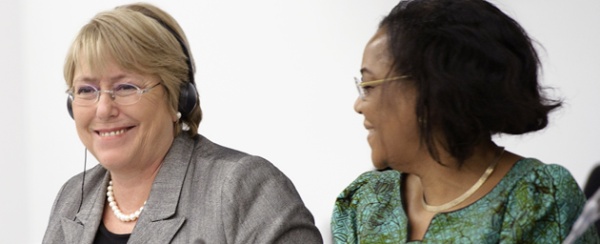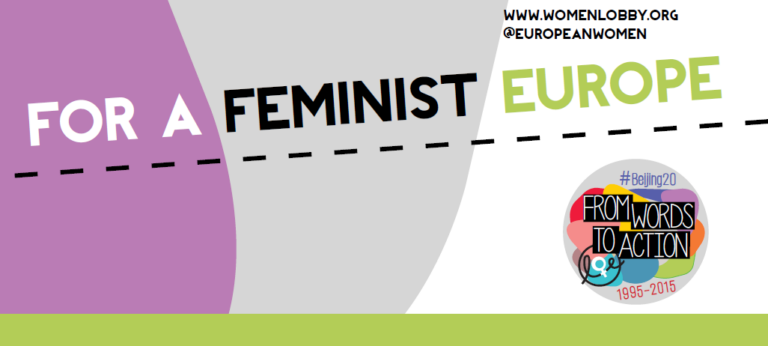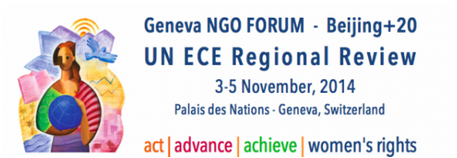[Brussels, 26 January 2011] During the first UN Women Executive Board meeting on Monday 24 January 2011, Michelle Bachelet, Under-Secretary-General and Executive Director, unveiled her vision and 100-day action plan for the organization. Read an exerpt of her speech below.
Statement to the First Regular Session of the Executive Board, United Nations Entity for Gender Equality and the Empowerment of Women
UN Women’s vision is one where men and women have equal opportunities and capacities and the principles of gender equality are embedded in development, peace and security agendas. Our key objective is to build national capacity and ownership to enable national partners to formulate gender-responsive laws and policies and to scale up successful strategies to deliver on national commitments to gender equality.
To meet this objective, UN Women will centre its work around five core principles: 1) providing demand-driven support to national partners to enhance implementation of international agreements and standards; 2) supporting intergovernmental processes to strengthen the global normative and policy framework on gender equality; 3) advocating for gender equality and women’s empowerment, championing the rights of women and girls — particularly those who are most excluded; 4) leading and promoting coherence in UN system work on gender equality; and 5) acting as a global broker of knowledge and experience, aligning practice with normative guidance.
Behind this vision is a strategic approach to leadership that is central to how we will work. There will be some areas where countries will look to UN Women to lead. However, there will also be many areas that impact women’s lives where others are already doing excellent work, and with whom we will form strong partnerships, bringing attention to the gender dimensions which may be overlooked.
And there will be still other issues of great importance, where we can add most value by ensuring the work of the UN system is coherent on gender equality through our coordination role. If we play our UN system coordination role well, we can have a major impact on women’s lives, without being operational in all areas.
Therefore, bearing in mind specific country contexts and capacities, UN Women will focus on five thematic priorities:
1) Expanding women’s voice, leadership and participation, working with partners to close the gaps in women’s leadership and participation in different sectors and to demonstrate the benefits of such leadership for society as a whole;
2) Ending violence against women by enabling states to set up the mechanisms needed to formulate and enforce laws, policies and services that protect women and girls, promote the involvement of men and boys, and prevent violence;
3) Strengthening implementation of the women, peace and security agenda, through women’s full participation in conflict resolution and peace processes, gender-responsive early-warning, protection from sexual violence and redress for its survivors in accordance with UN resolutions;
4) Enhancing women’s economic empowerment is particularly important in the context of global economic and environmental crises. UN Women will work with governments and multilateral partners to ensure the full realization of women’s economic security and rights, including to productive assets and full social protection;
5) Making gender equality priorities central to national, local and sectoral planning and budgeting: working with partners, UN Women will support national capacities in evidence-based planning, budgeting and statistics.
In addition to these five priority areas, UN Women will support UN partners who are leading the response in areas such as HIV and AIDS, migration, the Rule of Law, environmental degradation and climate change, social protection, and maternal and child health.
UN Women has identified a number of actions over the next three months which are fully outlined in the Summary Vision and 100 Day Action Plan you have all received. Let me highlight just a few:
To promote UN System coherence, we will work with the UN Development Group (UNDG) to develop a UNDG coordination strategy on gender, and to adopt and implement a gender resource tracking system, building on work by the UN Development Programme (UNDP).
To expand women’s voice, leadership and participation, we will partner with the Global Colloquium of Universities on an initiative called “Empowering women to change the world — what Universities and the UN can do.” We will continue to provide grants — US$16 million in the coming months — to government and non-governmental organization (NGO) partners to advance women’s political and economic empowerment.
To combat violence against women, we will continue to work closely with other UN agencies and departments such as the UN Population Fund (UNFPA); we will link our Safe Cities for Women programme with the UN Children’s Fund (UNICEF) Safe Cities for Children initiative, to create synergies in our combined efforts to empower local authorities, and the efforts of women’s and youth groups, to combat violence against women and girls in public places.
To strengthen the women, peace and security agenda, we will lead the development of a Strategic Framework for UN system implementation of UNSCR 1325 in partnership with UN entities and support further development of indicators to measure progress. Together with the Department of Political Affairs, we will support women in peace negotiations, increase numbers of senior women mediators and gender experts, and finalize guidance for mediators.
With the Department of Peacekeeping Operations (DPKO), we will test innovative pre-deployment training for peacekeeping troops.
To enhance women’s economic empowerment, UN Women will work closely with partners (UNDP, FAO, ILO and IFIs) to develop a transformative UN strategy to advance women’s economic empowerment with a special focus on rural women. Together with the World Bank, we will also regularly produce a global “Women’s Economic Opportunity Index.”
To advance gender equality priorities in development planning, budgets and statistics, working together with ILO, we will broaden the UN–European Commission Partnership focusing on Financing for Gender Equality at national level. We will partner with the Office of the High Commissioner for Human Rights (OHCHR) to provide technical expertise where countries request help to link monitoring with actions to implement the Convention on the Elimination of All Forms of Discrimination against Women (CEDAW).
The full statement is available at: http://www.unwomen.org/2011/01/statement-to-the-first-regular-session-of-the-executive-board-united-nations-entity-for-gender-equality-and-the-empowerment-of-women/



